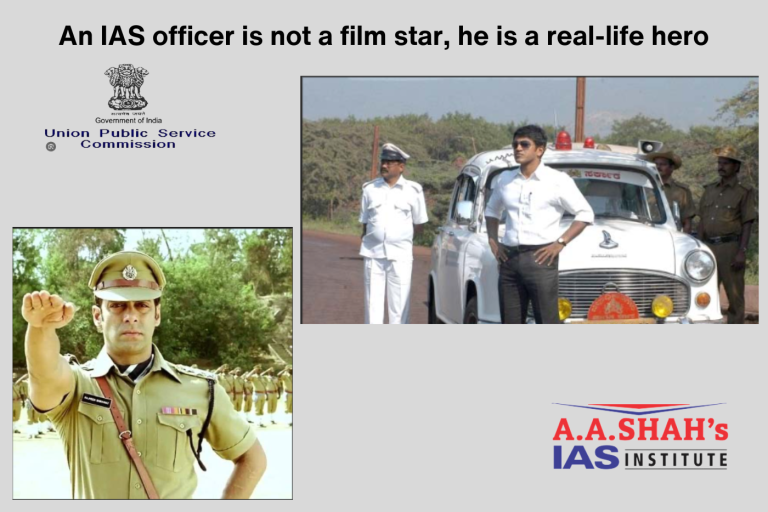
In the glitzy world of cinema, film stars captivate audiences with their charisma, style, and larger-than-life personas. They enjoy the adulation of millions, their lives often depicted as glamorous and adventurous. In contrast, an Indian Administrative Service (IAS) officer works mostly behind the scenes, quietly steering the wheels of governance and public administration. While film stars are celebrated for their on-screen roles, IAS officers are the unsung heroes whose real-life contributions significantly shape the nation. Here’s why an IAS officer is not a film star, but a real-life hero.
Dr Sanjeev Chopra, Former Director of Lal Bahadur Shastri National Academy of Administration (LBSNAA) has, in an interview with Indian Express, quoted; “An IAS officer is not a film star or politician.” He was talking with reference to the recent controversy of trainee IAS officer Puja Khedkar, which has raised many doubts in the minds of aspirants as well as general public with regard to UPSC, LBSNAA, the examinations process and the conduct of civil servants. According to him this case is only an aberration and that one incident cannot tarnish the image of UPSC. This recent incident should be seen as an aberration. It doesn’t happen every year. There are three aspects to this case – the first aspect is tricking or playing with the system as her father was a government officer, second is her problematic behaviour as a probationary officer, and third, which is most important, is the need of a systematic changes to assure such incidents do not happen in the future.
Dedication to Public Service
Film stars entertain and inspire through their performances, creating moments of joy, wonder, and sometimes reflection for their audiences. IAS officers, on the other hand, dedicate their lives to public service. Their roles involve implementing government policies, managing public resources, and ensuring the welfare of the citizens. Their decisions and actions directly impact the lives of millions, often determining the success or failure of crucial initiatives like healthcare, education, and infrastructure development.
Real-World Impact
While a film star’s influence is largely limited to the screen, an IAS officer’s impact is tangible and far-reaching. They tackle real-world problems such as poverty, illiteracy, and public health crises. For instance, during natural disasters, it is the IAS officers who coordinate relief efforts, manage resources, and work tirelessly to restore normalcy. Their contributions can save lives, improve living conditions, and foster economic growth.
Sacrifice and Commitment
The journey to becoming an IAS officer requires immense hard work, perseverance, and commitment. The selection process is rigorous, involving one of the toughest competitive exams in the country. Once selected, IAS officers often work long hours under challenging conditions, far from the limelight and the comforts of a glamorous lifestyle. Their careers are marked by sacrifices, whether it’s being posted in remote areas, dealing with bureaucratic pressures, or making tough decisions that may not always be popular but are in the public interest.
Ethical Leadership
An IAS officer is a beacon of ethical leadership and integrity. They are expected to uphold the highest standards of professionalism, fairness, and accountability. Unlike film stars, whose primary role is to entertain, IAS officers must navigate complex ethical dilemmas, balancing the needs and demands of various stakeholders while ensuring justice and equity. Their role requires a deep sense of responsibility, as their actions can set precedents and influence public trust in governance.
Behind-the-Scenes Work
Film stars enjoy widespread media attention and public adoration. In contrast, IAS officers work largely behind the scenes, with their efforts often going unnoticed by the general public. They are the backbone of the administrative system, ensuring that the machinery of government runs smoothly and efficiently. Their work might not make headlines, but it is crucial for the functioning of a stable and prosperous society.
Long-Term Vision
The work of an IAS officer is driven by a long-term vision for the nation’s development. They plan and execute policies that may take years or even decades to bear fruit. Their focus is on sustainable development, social justice, and the overall progress of the country. This contrasts with the more immediate, transient nature of fame in the film industry, where success is often measured by box office numbers and fleeting popularity.
Conclusion
While film stars may enjoy the glamour and adulation of the masses, IAS officers are the true heroes working diligently to shape the future of the nation. Their contributions may not always be visible or celebrated, but they are indispensable to the functioning and development of society. An IAS officer’s life is a testament to dedication, hard work, and a commitment to public service, making them the real-life heroes we often overlook.
